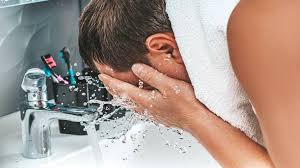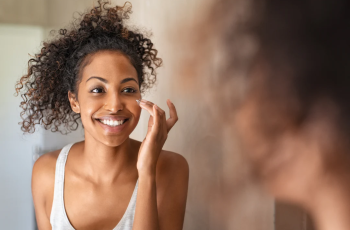
The Best Water to Wash Your Face With: Everything You Need to Know
Water seems simple, right? But when it comes to your face, not all water is created equal. From ice baths to tap water, we’re diving into which water is best for your skin.
Why Water Type Matters for Your Skin
You may think washing your face is as easy as splashing on any water. But the truth is, the type and temperature of water you use can significantly affect your skin.
The kind of water you choose depends on your Baumann Skin Type and other skincare products in your routine. Whether your skin is oily, sensitive, or dry, water choice matters.
Types of Water to Wash Your Face With
There are several types of water people use for cleansing:
Tap water, Filtered water, Distilled water, Bottled water, Micellar water, Thermal spring water
Let’s look at the benefits and drawbacks of each.
1. Tap Water
Tap water is the most accessible and budget-friendly. But if your tap water is hard, meaning high in calcium and magnesium, it might not be ideal for your skin.
Hard water can:
React with cleansers and make them more irritating
Damage your skin barrier over time
Leave mineral residue that can dull your skin
Soft water, on the other hand, contains fewer minerals and is gentler on sensitive skin.
💡 Tip: Search online for “tap water hardness in [your city]” to learn what’s in your water.
2. Filtered Water
Filtered water is a great compromise. It’s affordable, easy to install, and removes most harmful minerals and impurities.
Filters are available for sinks and showers and are ideal for people with:
Eczema, Rosacea, Hypersensitive skin
Using a water filter can make your skin feel cleaner and less irritated after washing.
3. Distilled Water
Distilled water is completely free of minerals and contaminants. It’s pure H₂O, and that can be good or bad.
Pros:
No reaction with your skincare products
Very gentle on sensitive or compromised skin
Cons:
Lacks any beneficial minerals
Can feel too “stripped” for some skin types
4. Bottled Water
Bottled water is another option, especially if it contains soothing minerals like selenium or strontium.
Avoid bottled water high in calcium or magnesium, which can irritate sensitive skin types. Check the label for mineral content before using.
5. Thermal Spring Water
This water is bottled directly from mineral-rich hot springs and often contains skin-calming ingredients.
It’s usually more expensive but helpful for:
Red, inflamed skin
Rosacea flare-ups
Skin healing after procedures
Some trusted brands even add their thermal water to facial sprays for on-the-go relief.
6. Micellar Water
Micellar water is not just plain water. It contains tiny oil molecules (micelles) that attract dirt, makeup, and excess oil.
It’s best for:
Removing makeup without rinsing
Sensitive or dry skin types
Quick cleansing when you’re on the go
Still, rinse it off if your skin feels sticky afterward.
What’s the Best Water Temperature to Wash Your Face?
Water temperature is just as important as water type.
🔥 Hot water feels relaxing but can:
Strip away natural oils
Damage your skin barrier
Trigger inflammation
❄️ Cold water can soothe irritation but may:
Reduce blood flow to the skin
Make skincare products less effective
🌡️ Lukewarm water is the sweet spot. It helps loosen dirt without shocking or irritating your skin.
Should You Wash Your Face With Only Water?
If you have very dry or inflamed skin, consider skipping cleanser in the morning. A gentle splash of lukewarm water might be all your face needs to start the day.
This is especially helpful if you have:
Active rosacea, Flaking or peeling skin, Skin on acne medication or retinoids, Just pat your skin dry gently with a soft towel.
What About Ice Water or Ice Baths?
Ice facials are trending, but they’re not suitable for everyone. Here’s when they can help—and when they don’t.
Good uses for ice water:
Right after dermal fillers to reduce bruising
After a sunburn or heat rash
To cool flushed, overheated skin
❌ Risks of ice water facials:
Can worsen rosacea
May damage the skin barrier in sensitive types
Reduces product absorption due to limited blood flow
Always consider your skin type before dunking your face in ice water.
Ice Face Rollers: Cool but Risky?
Ice rollers feel great, and they can reduce puffiness after procedures. But they’re not miracle tools.
Good for:
Reducing swelling after Botox or fillers
Soothing mild allergic reactions
Not helpful for:
Acne, Rosacea, Daily skincare needs
Use with caution, and avoid on broken or irritated skin.
What Water to Use If You Have Sensitive Skin?
If your skin is easily irritated, here’s a quick guide:
Very sensitive: Use thermal spa water at room temp
Mildly sensitive: Bottled or filtered water
Normal skin in soft water areas: Tap water is usually fine
Avoid extremes—no ice plunges or steaming-hot splashes.
How Water Affects Your Serums
Water matters before applying your serum. Why? Because minerals in water can react with ingredients in serums, reducing their effectiveness.
For best results:
Rinse off your cleanser with filtered or distilled water
Avoid hard water if using expensive serums
Consider thermal spa water if your skin is inflamed
This small step can make your active ingredients more effective.
Carbonated Water for the Face?
Some people use carbonated water to cleanse the skin, thanks to its slight acidity and tingle.
It may help with:
Removing dead skin cells, Boosting circulation
But it can also cause:
Dryness
Irritation in sensitive skin types
Try it once or twice a week if your skin is oily or dull, and stop if it stings.
Final Thoughts: Choose Wisely Based on Your Skin Type
Your skin is unique, and your water choice should match your skin’s needs.
Hard tap water can be problematic
Filtered or soft water is better for most people
Thermal and bottled waters are ideal for sensitive or healing skin
Lukewarm temperature is always best
If you’re using expensive skincare products, rinsing with the right water can help you get the most from them.
Quick Tips Recap
Use lukewarm water
Choose filtered or thermal water if your skin is sensitive
Avoid ice water unless calming flushed skin
Rinse off cleansers thoroughly
Don’t rely on hot water—it strips your barrier
Don’t skip researching your local water hardness
Remember: The water you use after applying your cleanser matters more than the one you use to apply it. Rinse well, and your skin will thank you.
For more expert skincare advice, visit us on social media or connect with Dr. Baumann on Reddit!
DQH Knowledge drop: In your 20s, your skin cell turnover decreases. (Cell turnover is a key component in keeping your skin youthful.) You know what else slows down? Your collagen production. Starting in your 20s, collagen decreases by about 1 percent per year. Should you want to prevent fine lines and wrinkles, start by eliminating behaviors that contribute to premature aging. “If it’s bad for you, it’s bad for your skin,” says dermatologist Michel Somenek.
“Cigarette smoking reduces blood flow to the skin and causes premature wrinkling and a dull skin texture. Making the repeated pursed motion to inhale can also cause smoker’s lines. Alcohol and recreational drugs are toxins for the skin that damage its cellular structure and DNA,” Somenek tells us. “The faster you eliminate vices while you are young, the better chance your skin and body have to recuperate.” Also, adopting an anti-aging routine in your 20s is key. After all, the best offense is a good defense. We spoke to Somenek and experts Joshua Ross and Audrey Kunin to find out more.
Keep reading for the best anti-aging products for your 20s, according to skincare professionals.
Sunscreen
“We all know that the sun is the number one cause of skin aging and starting the prevention in your 20s is very important,” Ross says. “The majority of your sun damage won’t start to appear until you’re in your 30s, so don’t wait until you see it surface or you’ll be behind the curve. Stay ahead of it with a good-quality zinc-based sunscreen worn daily.”
Farmacy Green Defense Daily Mineral Sunscreen
An invisible sunscreen with SPF 30, plus botanical extracts meant to protect skin with tons of antioxidants. Bonus: It’s clean and fine to use under makeup.
Bareminerals Complexion Rescue™ Tinted Moisturizer Broad Spectrum SPF 30
Although we recommend you use your SPF and moisturizer separately, we also understand moments when you don’t have time or energy for that extra step. For those times, this bareMinerals moisturizer is a great thing to have on hand.
Vitamin C Serum
“A great introduction to anti-aging is to start with a vitamin C serum in your morning skincare routine,” Ross says. “It’s a powerful antioxidant that will neutralize free radicals and brighten the skin.” He adds that it’s a great way to counteract the effects of the sun’s harmful rays, which, as previously mentioned, are among the biggest causes of premature aging.
Drunk Elephant C-Firma™ Vitamin C Day Serum
The Drunk Elephant C-Firma is a lightweight serum that promises to give skin a glow by combining the brightening powers of vitamin C with ferulic acid, l-ascorbic acid, and vitamin E. The included sodium hyaluronate is meant to replace hydration loss, so you shouldn’t have to deal with any irritation.
Sunday Riley C.E.O. Rapid Flash Brightening Serum
This potent serum is jam-packed with vitamin C (15 percent, to be exact), which means it’s a potential superstar at both brightening skin and dousing it in antioxidants.
Peptides
Using peptides on your skin has many benefits, says Somenek. “The skin barrier is what defends the body against pollution, UV rays, bacteria, and toxins. It can be damaged by several everyday factors. Using topical peptides aids in building a stronger barrier,” he says. “Peptides comprise elastic fibers, which are a type of protein. These fibers help to make skin appear taut and firm. Peptides can also help repair damaged skin, relieve inflammation, and even out skin tone. Some peptides can kill acne-causing bacteria that is common in 20-somethings.”
Kunin agrees, saying, “Peptides are an excellent entry point for supporting collagen.” She recommends looking for face and eye treatments that contain these collagen-boosting powerhouses.
Charlotte Tilbury Magic Eye Rescue Cream
This Charlotte Tilbury super-emollient eye cream has a base of coconut oil and shea butter (read: it’s incredibly hydrating). Botanicals plus peptides are meant to help reduce dark circles and boost collagen, respectively.
This creamy moisturizer serves up potent collagen-boosting peptides and pycnogenol, and antioxidant-rich vitamin C. “Instead of sitting on top of the skin, peptides penetrate the outer layer so they go deep. The ‘signals’ they send tell the cells to produce elastin and collagen, which are needed for youthful-looking skin,” explains Somenek.
At-Home Peel Pads
Remember that skin cell turnover fiasco we talked about earlier? One way to help support it is by exfoliating. “Exfoliation is important to help keep skin fresh and luminous,” Kunin says. She recommends using at-home peel pads as an easy and effective way to exfoliate.
“The goal in your 20s is to fight the slowing pace of cell turnover. It is wise to use products that gently exfoliate, yet still remove oil and other impurities. Products that have Alpha Hydroxy Acids (AHA) or Beta Hydroxy Acids (BHA) are a good choice.”
According to Somenek, you should only exfoliate two to three times a week. “People of all ages are guilty of over-exfoliating and that can be too much of a good thing,” he says.
Dermadoctor Kakadu C Intensive Vitamin C Peel Pad
A few swipes of this Derma Doctor powerful peel pad promise to leave your skin glowing and smooth, thanks to the seven (yes, seven) types of chemical exfoliants, including AHA and BHA. It also contains vitamin C via Kakadu plum extract for added brightening and antioxidant protection.
KEY INGREDIENTS Kakadu plum extract is sourced from the Kakadu plum, a fruit grown in northern Australia. It contains vitamin C, which restores the skin’s natural barrier, increases collagen production, and soothes irritation.
Dr. Dennis Gross Skincare Alpha Beta® Universal Daily Peel Pads
These are the gold standard of peel pads, with a cult following and over 900 five-star reviews on Sephora. They’re easy to use and contain a blend of anti-aging exfoliating acids.
Emollient Night Cream
“In your 20s, you need to start upping the hydration in your skincare routine. You may have been cautious of over-moisturizing because of acne in your teens, but as you enter your 20s, your skin transitions and becomes drier,” Ross says. “I recommend an emollient night cream added into your evening skincare regimen.”
“Twenty-somethings need to make sure that they are not using creams that will clog their pores and cause excess oil production,” says Somenek. Opt for non-comedogenic products.
Cerave Skin Renewing Night Cream
One great choice is the CeraVe Skin Renewing Night Cream, which is a non-comedogenic night cream that leaves skin soft and glowy. It combines the moisturizing powers of ceramides and hyaluronic acid.
RoC Retinol Correxion Max Hydration Creme
“The best night cream ingredients contain retinol, benzoyl peroxide, and/or salicylic acid or hyaluronic acid. The goal is to moisturize, yet remove excess oil,” says Somenek. This Roc Retinol Correxion cream fits the bill as it contains both hyaluronic acid and retinol so it promises to moisturize while also being non-comedogenic.



